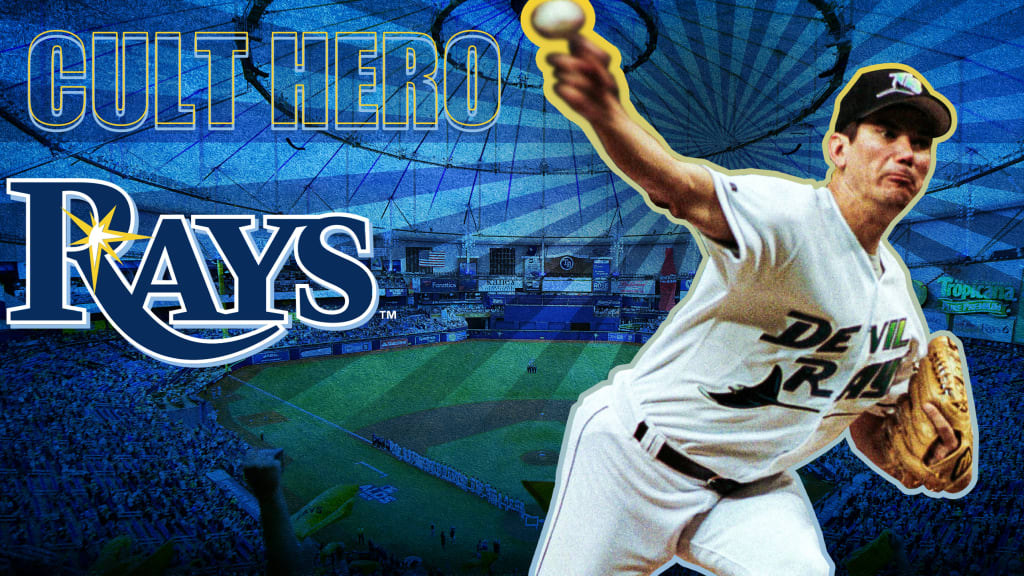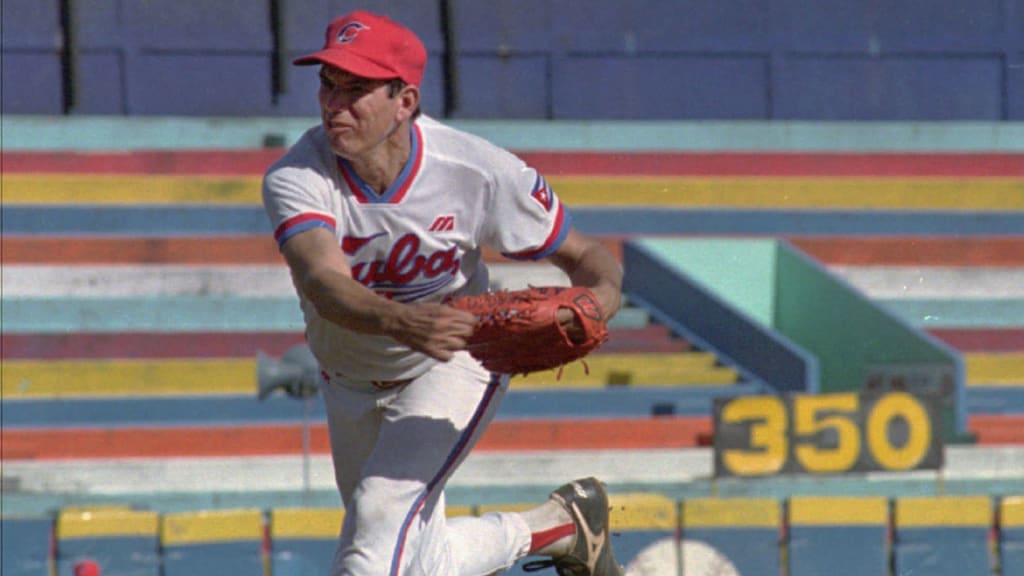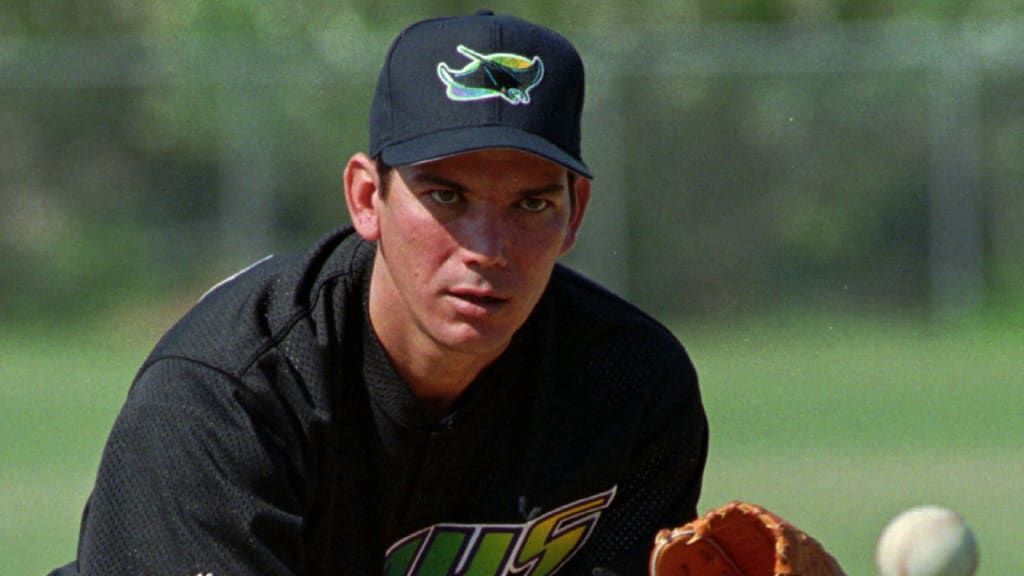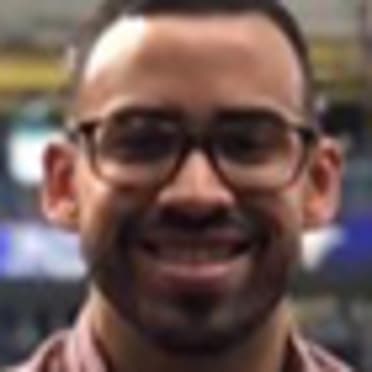
ST. PETERSBURG -- During the 1996 Summer Olympics in Atlanta, Rolando Arrojo sat alone in a dark hotel room. His thoughts raced as he was getting ready to defect, knowing that it would change his life forever.
That July night wasn’t the first time that Arrojo had planned on defecting from Cuba. But each of those previous times, he had ended up rethinking his decision at the last minute. For Arrojo, it wasn’t a matter of fearing the consequences as much as it was the fact that life outside of his native country was a big unknown for the Cuban pitcher.
But this time, he was fully committed.
“When I left Cuba, I looked back and I said, ‘Wow, I’m probably never going to be able to come back to my country,’” Arrojo told MLB.com in Spanish. “And I’ve actually never been able to go back to Cuba.”
Once Arrojo successfully defected, his attention quickly shifted to signing with a Major League team. Pitching in the big leagues was his dream and a big reason why he decided to pursue a new life in the United States.
“It was a dream for everyone,” Arrojo said. “Especially for someone from Cuba, who they told that it was impossible.”
Life in Cuba
During his time in the Cuban National Series, Arrojo established himself as one of the most dominant pitchers in the league. He was the ace on a pitching staff that led Villa Clara to three consecutive championships from 1993-95. Arrojo also helped the Cuban team win a Gold Medal in the ’92 Olympics and was slated to be an integral part of the ‘96 team before he defected.
Throughout his 13-year career, Arrojo went 154-98 while posting a 3.50 ERA. The right-hander also said he pitched close to 2,000 innings. In Cuba, pitchers typically throw complete games, and they pitch up to four times a week.
“That caused a lot of strain on the arm,” Arrojo said. “When I came to the Majors, I never wanted to get taken out in the sixth. I would always say, ‘Why is he taking me out?’ and the manager would always laugh and tell me to give him the ball. But I would just tell him that I was still warming up.”

While in Cuba, Arrojo won Rookie of the Year with Matanzas, where he played with the father of former Rays outfielder Guillermo Heredia. Arrojo continued his career in Villa Clara, where he played with the father of Rays third baseman Yandy Díaz.
When he looks back at the decision to defect, Arrojo has no regrets. He was able to fulfill a dream of playing in the Major Leagues and gave his family a better life. But at the time of the decision, Arrojo knew there were challenges ahead.
“You leave your family behind, your friends. You leave your memories behind,” Arrojo said. “Everything is difficult.”
While Arrojo hasn’t been able to return to Cuba, some of his family has been able to make it to the United States. The majority of his family still lives in Cuba, and he’s hopeful that one day they will reunite.
Chasing the Major League dream
After defecting, Arrojo established himself as a resident in Costa Rica, allowing him to pursue a deal with Major League teams. His agents held workouts that were attended by all 30 teams, and about a dozen emerged as serious suitors.
The Devil Rays, who were set to play their inaugural season in 1998, were looking to make a splash. The two sides came to an agreement, making Arrojo the team's first Cuban-born signing.
“I didn’t even know what an expansion team was,” Arrojo said. “They told me what it was when I signed. As kids in Cuba, we didn’t have any knowledge about the Majors, so I wasn’t even aware that the Rays were an expansion team.”

Arrojo spent the 1997 season with Class A St. Petersburg, because the franchise didn’t want to expose him to a drastic change in climate.
Over that year, Arrojo began to gain more confidence. He had been successful in Cuba, but there were new challenges to pitching in the United States. Arrojo helped the team win the Florida State League and was selected to pitch in the Arizona Fall League just a couple of weeks later.
That’s where Arrojo met former Angels manager Mike Scioscia. At the time, Scioscia was working in the Dodgers organization as manager of the AFL’s Peoria Javelinas.
“Mike Scioscia would always tell me that I was a big league pitcher,” Arrojo said. “He told me that I reminded him of Kevin Brown, who played with the Marlins and Dodgers. He would compare me to him because of the sinker that I had. I would be like, ‘Wow, he’s such a good pitcher.’”
Arrojo led the Javelinas to the AFL championship and was named the MVP. He then carried that momentum into Spring Training as the Devil Rays were gearing up for their inaugural season.
“[Devil Rays manager] Larry Rothschild gave me all the confidence in the world,” Arrojo said. “Rothschild told me that I was going to be the second starter on the team and that I would be a workhorse for the team.”
In 1998, Arrojo made history with the Devil Rays. He was the winning pitcher in the franchise’s first victory and became its first All-Star after going 10-5 with a 3.06 ERA in the season's first half.
“Winning that first game was the best moment that I had in the big leagues,” Arrojo said. “Being the first winner for a franchise, that’s something that’s really important and lasts forever.”
Arrojo finished the season with a 14-12 record and 3.56 ERA. He was second in the AL Rookie of the Year vote behind Oakland’s Ben Grieve. But after his successful rookie season, Arrojo struggled to find repeat success. He went 7-12 while dealing with a hip injury in 1999, and he was traded to the Rockies before the 2000 season. That deal brought Vinny Castilla to Tampa Bay.
The move came as a shock to Arrojo. He believes he was just starting to get comfortable in Tampa Bay, and the adjustment to Colorado was a difficult one for a pitcher unfamiliar with the idea of players being traded.
“I didn’t like the move because for me, Tampa Bay was my home,” Arrojo said. “And then when I was adapting to Colorado, they traded me to Boston. I was like, ‘What in the world is this?’ … For the people that are born here, getting traded isn’t as difficult because they’re used to it. But it was tough for me.”
Arrojo played five seasons in the Majors before retiring in 2003. Over his career, Arrojo went 40-42 and posted a 4.55 ERA in 158 Major League appearances.
Where is he now?
Arrojo still resides in the Tampa Bay area with his family. He has been able to give his family a better life because of his decision to defect, but Arrojo is now pursuing another dream: finding a scouting opportunity in baseball.
He has been training kids in the area, but he wants to break in as a scout for a professional organization. He doesn’t care if he has to travel to another country or work throughout the Minors; Arroyo says he just wants a chance to impact the next generation of pitchers -- Latino players, in particular.
In 2017, Arrojo served as the pitching coach for the Venados de Mazatlan in Mexico's winter league. He has also remained involved with Cuban-born players in the Majors and spent time training the late José Fernández while he attended high school in the Tampa Bay area.
Arrojo, 51, has reached out to multiple organizations, but he is still waiting for someone to take a chance on him.
“I want to help train Latino players for an organization, but I haven’t had any luck,” Arrojo said. “I’ve wanted to help out with that my entire life. I would work for anyone. I just want to be involved with baseball.”
As Arrojo continues to wait, he remains thankful for all the opportunities baseball has presented to him.
“It was all worth it,” Arrojo said. “I would do it all over again.”
